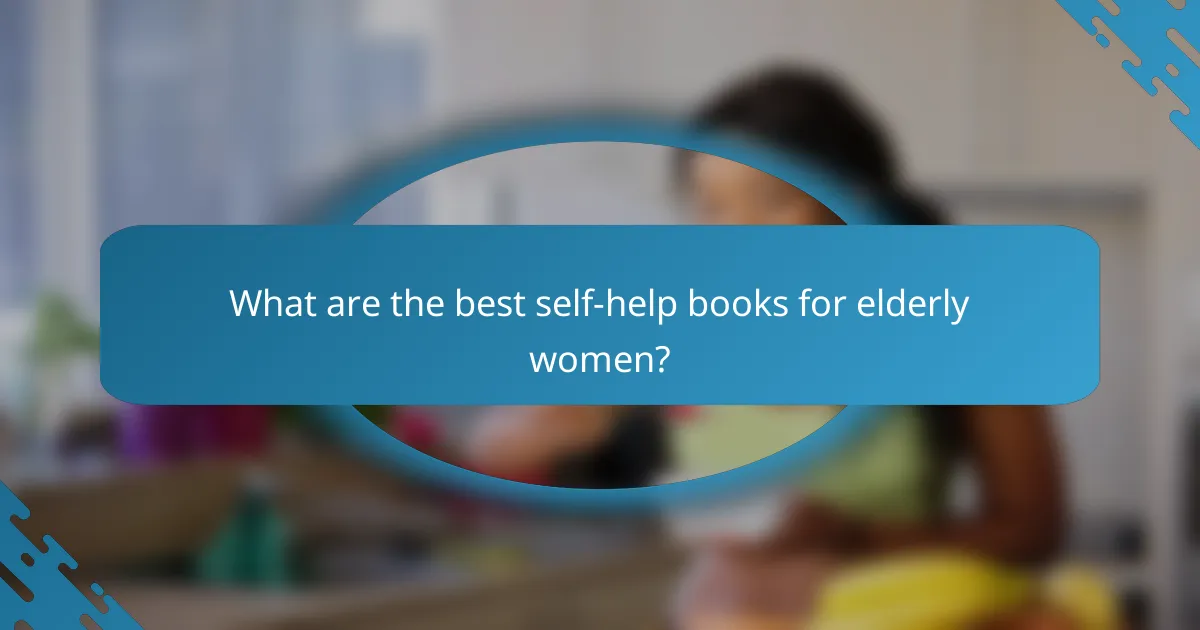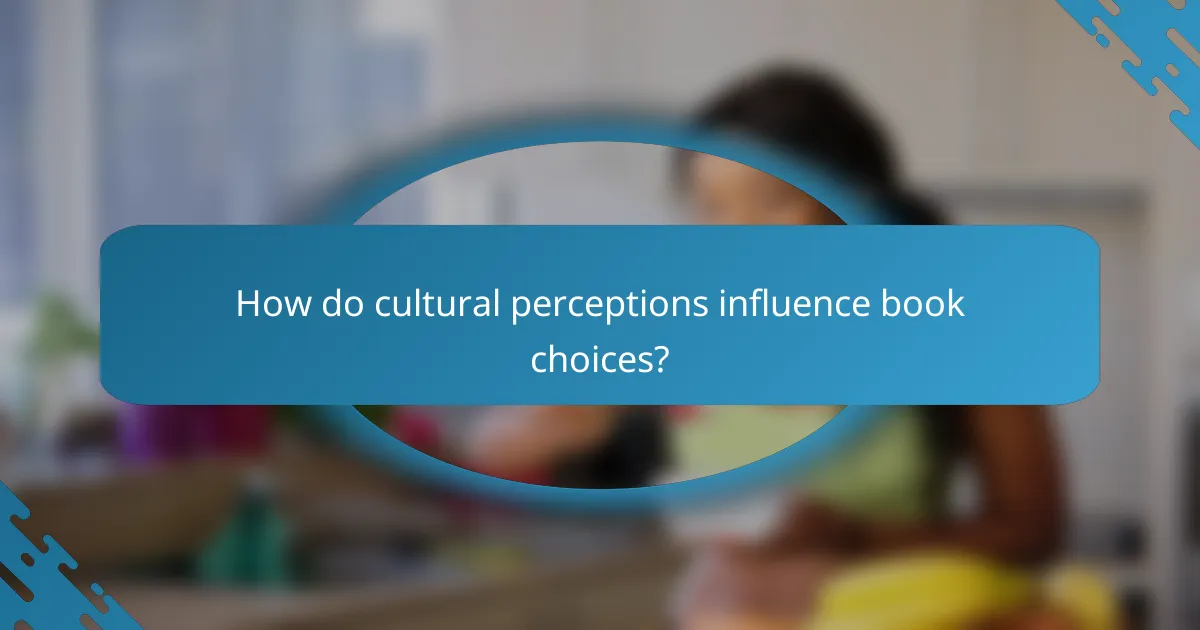Finding empowering self-help books can significantly enhance mental wellness and resilience for elderly women. This article explores impactful titles like “The Gifts of Imperfection” and “Being Mortal.” It also examines how cultural perceptions shape book choices and offers tips for creating an engaging reading environment. Discover how these reads can foster personal growth and emotional strength.

What are the best self-help books for elderly women?
“Best Self Help Books for Women: Empowering Reads for Elderly Mental Wellness and Resilience” includes several impactful titles. Notable selections are “The Gifts of Imperfection” by Brené Brown, which emphasizes self-acceptance, and “Being Mortal” by Atul Gawande, focusing on aging with dignity. “The Art of Happiness” by the Dalai Lama offers insights on finding joy, while “You Are Here” by Thich Nhat Hanh guides mindfulness practices. These books foster mental wellness and resilience in elderly women, promoting personal growth and emotional strength.
How do these books promote mental wellness?
Best self-help books for women promote mental wellness by providing practical strategies, fostering resilience, and enhancing self-awareness. These books often include relatable stories and insights, helping readers connect with their experiences. Research shows that reading can reduce stress by up to 68%, making it an effective tool for mental health. By addressing issues like self-esteem and emotional regulation, these books empower elderly women to navigate life’s challenges with confidence.
What themes are commonly addressed in these books?
Self-help books for women often address themes of empowerment, resilience, mental wellness, and personal growth. These themes provide strategies for overcoming challenges, enhancing self-esteem, and fostering emotional well-being. Many books also focus on building supportive communities and navigating life transitions, particularly relevant for elderly readers. Unique attributes include tailored advice for aging women and practical exercises to cultivate mindfulness and self-compassion.
How do they tackle loneliness and isolation?
Best self-help books for women address loneliness and isolation by offering strategies for emotional resilience and community building. These books often emphasize self-reflection, encouraging readers to understand their feelings and connect with others. Titles like “The Gifts of Imperfection” by Brené Brown promote vulnerability, while “Untamed” by Glennon Doyle inspires authenticity and self-acceptance. Many books include exercises that foster social connections, enhancing the reader’s support network. Additionally, they provide insights into mindfulness practices, helping women navigate loneliness effectively.
What strategies do they offer for coping with loss?
Best self-help books for women coping with loss provide practical strategies for resilience and emotional healing. These books often emphasize mindfulness, self-compassion, and the importance of community support. Notable titles include “The Year of Magical Thinking” by Joan Didion, which explores grief and acceptance, and “Option B” by Sheryl Sandberg, focusing on building resilience after loss. Each book offers unique insights, helping women navigate their emotions and find strength during challenging times.
What unique features set these books apart?
These books stand out due to their unique focus on women’s experiences and mental wellness in later life. They combine practical advice with relatable narratives, fostering resilience through community and self-discovery. Notably, they often include exercises tailored for elderly women, enhancing engagement and personal growth. Additionally, the integration of diverse perspectives enriches the reading experience, making these books particularly impactful for their target audience.
How do they incorporate personal stories and experiences?
Best self-help books for women often incorporate personal stories and experiences to enhance relatability and connection. These narratives provide real-life examples of resilience, demonstrating how individuals overcame challenges. Such storytelling not only inspires but also fosters a sense of community among readers. For instance, authors may share their journeys, struggles, and triumphs, allowing readers to see themselves in similar situations. This unique attribute of personal storytelling enriches the reading experience, making the lessons more impactful and memorable.
What role does humor play in these narratives?
Humor plays a significant role in self-help narratives for women by enhancing engagement and promoting resilience. It can lighten heavy topics, making them more approachable. Laughter fosters connection, which is crucial for emotional wellness. Additionally, humor can serve as a coping mechanism, helping elderly women navigate challenges with a positive mindset. These empowering reads often incorporate humor to illustrate lessons, making them memorable and relatable.
How can these books enhance resilience in elderly women?
Self-help books can significantly enhance resilience in elderly women by providing practical strategies and emotional support. These books often focus on themes like self-acceptance, coping mechanisms, and personal growth. For instance, titles that emphasize mindfulness and positive thinking can help women navigate life’s challenges with a healthier mindset. Additionally, stories of other women’s journeys can foster a sense of community and shared experience, reinforcing the belief that they are not alone. Such empowering reads can ultimately lead to improved mental wellness and greater resilience in facing adversity.
What skills do they teach for overcoming challenges?
Self-help books for women teach skills like resilience, emotional regulation, and problem-solving to overcome challenges. These skills empower elderly women to manage stress and improve mental wellness. For instance, books may provide techniques for mindfulness, fostering a positive mindset, and building supportive relationships. Additionally, they often include personal stories that illustrate overcoming adversity, making the lessons relatable and actionable.
How do they encourage positive thinking and self-acceptance?
Best self-help books for women encourage positive thinking and self-acceptance through relatable narratives and practical exercises. These books often emphasize self-compassion, resilience, and personal growth. For example, titles like “The Gifts of Imperfection” by Brené Brown focus on embracing flaws, fostering authenticity, and cultivating a sense of belonging. Additionally, many books provide actionable strategies, such as journaling prompts and affirmations, to reinforce self-acceptance and positive thinking. These empowering reads cater specifically to elderly women, addressing unique challenges while promoting mental wellness and resilience.
What are some rare but impactful titles worth exploring?
“Some rare but impactful titles worth exploring include ‘The Gift of Imperfection’ by Brené Brown, focusing on self-acceptance, and ‘Women Who Run with the Wolves’ by Clarissa Pinkola Estés, which empowers through storytelling. These books uniquely address mental wellness and resilience in elderly women.”
Which authors focus specifically on elderly women’s issues?
Several authors focus specifically on elderly women’s issues, providing insights and support. Notable names include Mary Pipher, who addresses aging and identity in “Another Country,” and Joan Chittister, who explores spirituality and resilience in “The Gift of Years.” Additionally, authors like Helen McCrory and Anne Lamott offer perspectives on navigating life’s later stages. Their works contribute significantly to mental wellness and empowerment for elderly women.
What lesser-known books have received critical acclaim?
“Best Self Help Books for Women” includes lesser-known titles like “The Gifts of Imperfection” by Brené Brown, “The Art of Asking” by Amanda Palmer, and “Women Who Run with the Wolves” by Clarissa Pinkola Estés. These books empower women through themes of resilience and mental wellness, offering unique insights and practical advice. Each book has received critical acclaim for its impact on personal development and emotional growth.

How do cultural perceptions influence book choices?
Cultural perceptions significantly shape book choices, particularly for self-help literature aimed at women. These perceptions influence preferences for themes, language, and representation in narratives. Women often seek books that resonate with their experiences, promoting empowerment and mental wellness.
Cultural factors, such as societal norms and values, determine which topics are deemed relevant. For instance, resilience and emotional strength are prioritized in cultures that emphasize community support. Additionally, the portrayal of elderly women in literature affects engagement; positive representations can enhance relatability and inspire readers.
Research indicates that women are more likely to choose self-help books that reflect their cultural backgrounds and personal struggles. This connection fosters a deeper understanding and encourages the pursuit of mental wellness. Ultimately, cultural perceptions guide women towards empowering reads that validate their experiences and promote resilience.
What are the common barriers to reading among elderly women?
Elderly women face several barriers to reading, including vision impairment, cognitive decline, and lack of access to suitable materials. These factors can significantly hinder their ability to engage with self-help books that promote mental wellness and resilience. Additionally, physical limitations, such as arthritis, can make holding books challenging. Social isolation may also reduce motivation to read, as companionship often enhances the reading experience. Addressing these barriers can help improve access to empowering literature for elderly women.
How can community programs promote these readings?
Community programs can effectively promote self-help readings for women by creating supportive environments. These programs can host book clubs focused on empowering literature, fostering discussions that enhance understanding and application of concepts. Workshops led by mental health professionals can provide deeper insights into the material, emphasizing resilience and wellness. Collaborations with local libraries can expand access to these books, ensuring that elderly women can easily find and engage with empowering reads. Community events featuring guest speakers can inspire participants and reinforce the benefits of mental wellness through literature.

What actionable tips can enhance the reading experience?
To enhance the reading experience of self-help books for women, focus on creating a comfortable environment. Choose well-lit spaces and minimize distractions. Engage with the content by taking notes or highlighting key insights. Join book clubs for discussion and deeper understanding. Incorporate reading routines to build consistency.
How can readers create a supportive book club environment?
Readers can create a supportive book club environment by fostering open communication and inclusivity. Establish ground rules that encourage respectful discussions, allowing everyone to share their thoughts on self-help books that empower women. Incorporate diverse perspectives, especially from elderly members, to enhance resilience themes. Schedule regular meetings to build camaraderie and ensure a consistent space for sharing insights. Encourage members to recommend their favorite titles, focusing on those that promote mental wellness.
What strategies can help elderly women connect with the material?
Reading self-help books fosters connection and understanding for elderly women. Strategies include selecting relatable topics, joining book clubs for discussion, and utilizing audiobooks for accessibility. Encouraging shared experiences enhances engagement. Personal reflection on readings deepens comprehension and emotional resonance.
What are common mistakes to avoid when selecting self-help books?
When selecting self-help books, avoid common mistakes like choosing based on popularity rather than relevance. Prioritize books that specifically address elderly mental wellness and resilience. Look for authors with expertise in psychology or gerontology. Also, consider the book’s format; some may prefer workbooks or guided journals over traditional narratives. Lastly, be cautious of overly simplistic or generic advice that may not resonate with personal experiences.